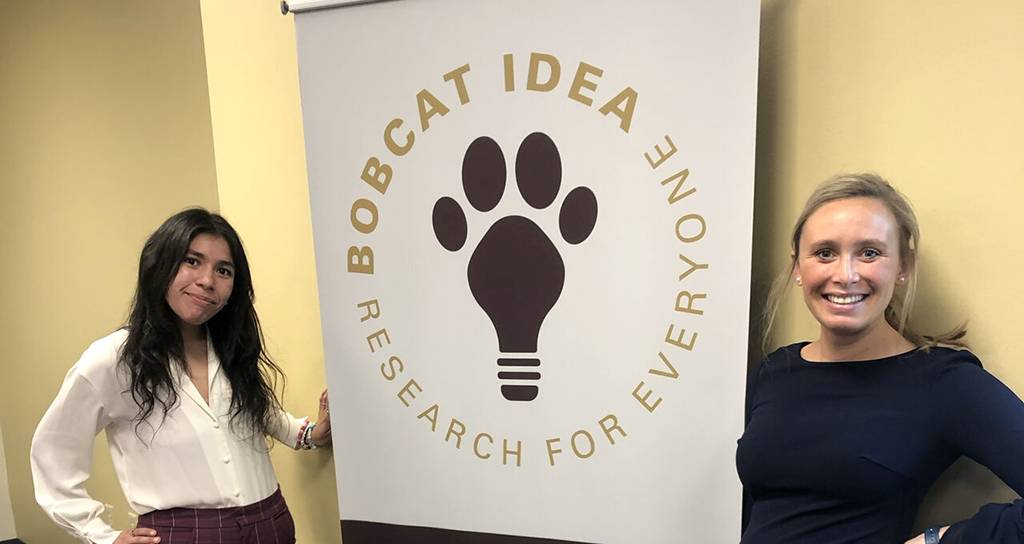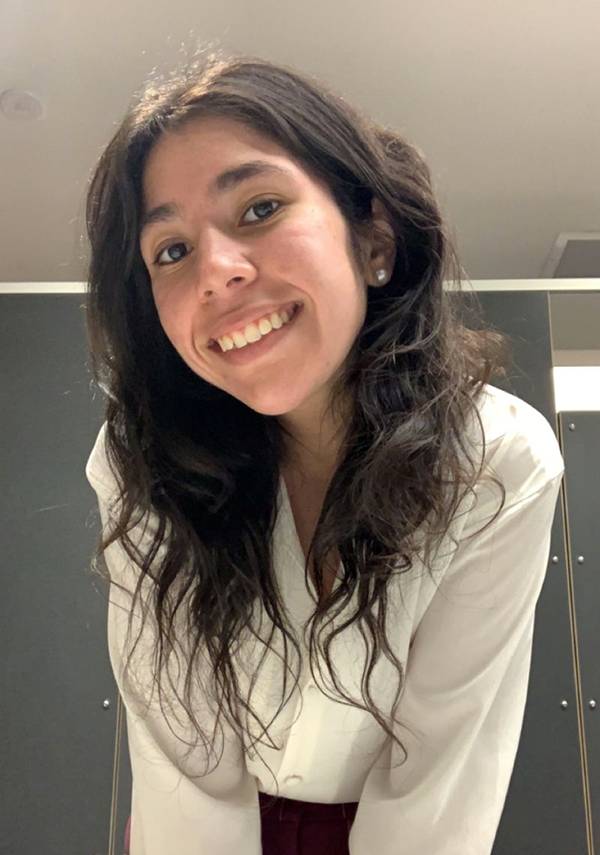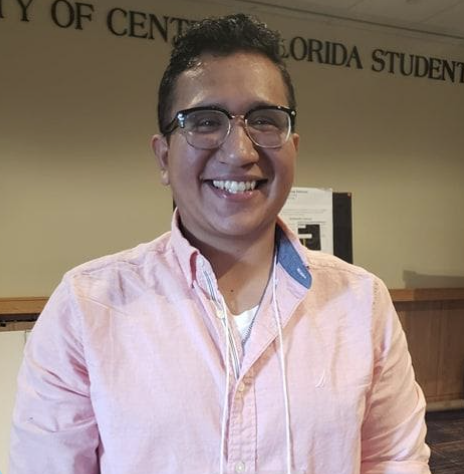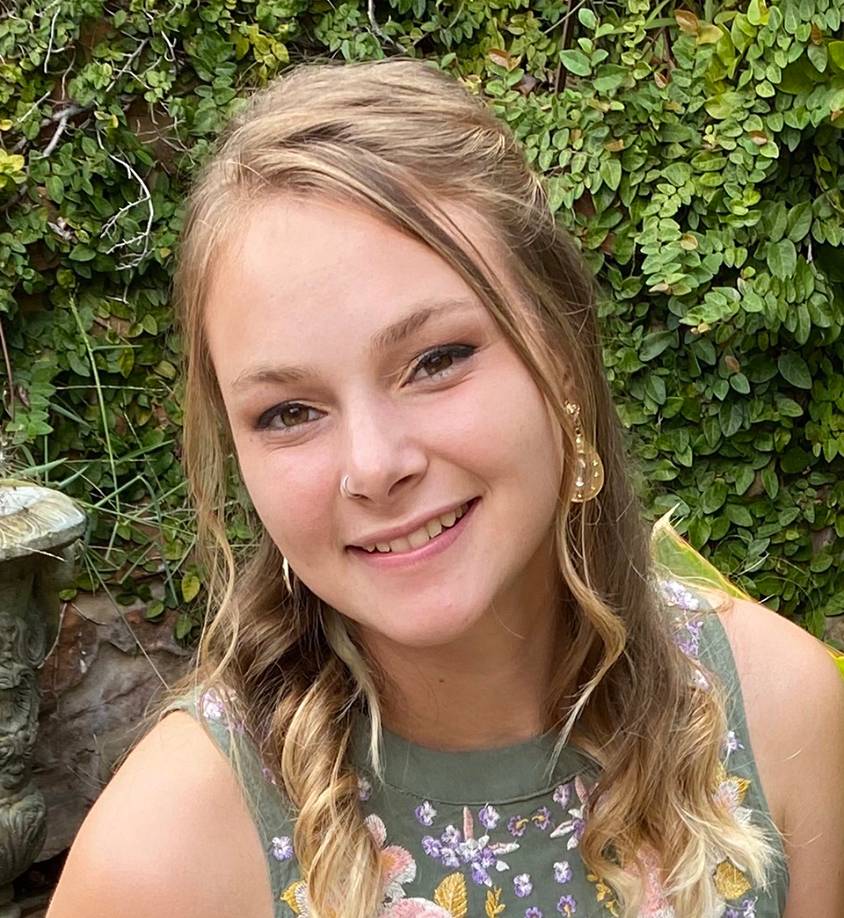IDEA Center | April 18, 2022

Undergraduates with mentored research projects inspired fellow students at the Innovation, Discovery, Exploration, and Analysis (IDEA) Center’s inaugural research forum, sharing their projects on technology in social work, ethics in physics, and sustainable agriculture.

Brianna Rodriguez
Senior Social Work Major from Austin, TX
Faculty Mentor: Dr. Kelly Clary, Assistant Professor, School of Social Work
“It is essential that the profession of social work adapt to the dynamic nature of technology. The COVID-19 pandemic has proven that although technology is an integral part of the social work profession, there are hidden challenges. Field educators play a prominent role in the future of social work and technology. Field educators are social work professionals who provide student interns with the opportunity to have a hands-on learning experience in the field. They directly mentor and guide student interns during their final semester in their social work degree program.
My team of four Texas State social work faculty researchers and five undergraduate research assistants received a grant to evaluate field educators' perceptions and concerns about technology, current use of technology, and plans for engaging student interns with technology. Telehealth and online communication tools are common in social work and are especially useful in connecting with clients who aren’t physically accessible. Also, databases and online filing systems are important in the operations of the social work agency to increase efficiency.
Fifty-four field educators completed surveys, and 15 participants completed 30-minute interviews for data collection. After the data was assessed, common themes emerged: the benefits of using technology, concerns and limitations, technology training, and recommendations for field educators. The research findings will allow for new considerations in grant funding and progressive change for stakeholders in the field of social work.
Before becoming a research assistant, I had not had the chance to work with a team of any kind or on a large-scale project. The COVID-19 pandemic made it incredibly difficult to figure out what I was passionate about since there were so many restrictions in place. Becoming a research assistant empowered me as a student. I finally felt as if I was contributing to a greater good. Research also helped me understand the coursework I have been learning for the past three years on a new level. Research has shown me that so many topics, populations, and communities have not been assessed yet. After years of being a consumer of research as a student, it finally sunk in that I need to work on producing research. At my current internship, I used the skills learned from my research assistant position to earn a micro-grant and conduct research to use that grant to fill gaps in my agency.”

Xander Vasquez
Senior Physics Major from Bellville, TX
Faculty Mentor: Dr. Alice Olmstead, Assistant Professor, Department of Physics
“It is important for physics students to develop ethics knowledge, yet it is rarely taught in undergraduate physics classes. We are addressing this limitation in an ethics unit for an observational astrophysics class at Texas State. The unit encompasses an introduction of the Thirty Meter Telescope (TMT), a local perspective in San Marcos, a history of Hawaii, perspectives about the TMT, and formal ethical frameworks.
The ethical conflict centers on whether astronomers should construct a large telescope on Maunakea in Hawaii (due to the location’s favorable conditions for observing faint objects), or whether they should not construct the telescope due to a history of colonizing behavior by external forces and a lack of listening to the perspectives of Native Hawaiians.
Our analysis indicates students experienced an increased understanding of the complexity of the issue, increased empathy to both sides, and a desire for a compromise. To support the physics educator community in teaching about ethics in physics classes, I will highlight what worked well in our design and what could have been improved. I will present our preliminary analysis of data from Spring 2020 and 2021, with an emphasis on the students’ written work at the end of the unit.
Engaging in this research has enhanced my learning experience at Texas State by providing me with a greater understanding of other people’s backgrounds, thoughts, and decision-making processes. It has enhanced my future career opportunities.”

Emma Fukuda Kathcart
Senior Animal Science Major from Newport Beach, CA
Faculty Mentor: Dr. Merritt Drewery, Assistant Professor of Applied Animal Science
“The project I’m a part of revolves around developing a way to use insects as animal feed. My project was to evaluate a novel protein supplement for beef cattle, black soldier fly larvae. As the global food demand is increasing, identification of sustainable alternatives to conventional protein sources for cattle is becoming more necessary.
Black soldier fly larvae is high in protein and can be reared on low inputs with opportunities for waste recycling. This project examined the effects of feeding black soldier fly larvae on forage intake and digestion in beef steers, necessary data to further the research base required for the approval of the larvae as feed for cattle. These results were published in the Journal of Translational Animal Science in January 2022.
Engaging in research has opened up a world of new opportunities for me at TXST. I have been able to work closely with many professors in the department who have a wide variety of backgrounds in life and education. This has enhanced my professional network and now I have so many connections to call upon when I have questions or need assistance in my academic career. Through research, I have also learned about my topic of interest, ruminant nutrition, in much deeper ways than I would have in classes. These experiences, my connections, and my newfound skills and professionalism that I have gained through research will set me up for success in my future career and give me an edge over other job applicants.”
These student researchers and their faculty mentors discussed their joint research projects as panelists at the IDEA Center’s Undergraduate Research Forum on March 23. The IDEA Center offers undergraduate students in any major an opportunity to have a faculty-mentored research and creative expression experience similar to the experiences that these student researchers had through working with their faculty mentors. The IDEA Center’s overall mission is to assist undergraduates in gaining awareness of research and ethical research practices, and help them produce and disseminate a research or creative expression project. Learn more about the IDEA Center.
Share this article
For more information, contact University Communications:Jayme Blaschke, 512-245-2555 Sandy Pantlik, 512-245-2922 |
